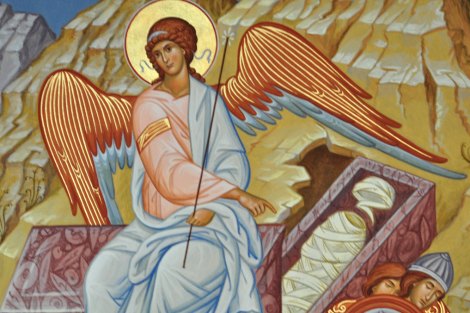
David Tacey reflects on faith and belief. Andrew Hamilton replies.
I remember the moment well. I was 14, and attending church with my parents in my home town of Alice Springs.
We were reciting creeds and the priest was telling us about the Virgin Birth as if it were a literal, historical event, and suddenly I had the feeling that I was in the presence of wrong thinking. These miracles and wonders, I felt, were not historical facts, but literary metaphors invented by scripture writers.
My sister reached a similar conclusion at the same time, but we had different responses. She decided that religion was nonsense and threw it out, becoming 'atheist' and 'enlightened', and encouraged me to do likewise.
But I thought then, as now, that her response was far too extreme. We need to regard the miracles and wonders as metaphors of the life of the spirit, and of the spirit's ability to transform our lives. I was not willing to throw out Jesus or God once I realised that many of the stories were symbolic configurations.
I thought then, as now, that we were in desperate need of separating genuine faith from superstitious belief. The Church seemed to encourage us to believe faith and belief were synonymous. If one challenged the miracles, one was 'losing faith' and moving from God. I felt this was brainwashing conducted under the mantle of sanctity. Such thinking makes a mockery of our intelligence.
Imagine my delight when, years later, I discovered several traditions that explored the scriptures as a mixture of myth and history. These included scripture studies, anthropology, psychoanalysis, philosophy of religion, and progressive Protestant theology, such as that of Rudolf Bultmann and Paul Tillich.
But I hardly ever found any Catholic theology that saw the foundational 'events' of the Christian story as myths and symbols. Rather, most Catholics assumed that events such as the Virgin Birth, the Physical Resurrection, walking on water and so on were historical. The more ancient Christian tradition is deeply entrenched in literal thinking and harder to turn around.
These miraculous 'events' were originally written as parables and understood as such in the early years of the fledgling Church. But when this Near Eastern religion was exported to the West, it was read with literal eyes, and its spiritual meaning was lost. The West did not understand Jewish sacred conventions, the importance of symbol, myth and midrash in narrating stories.
One can only understand Christianity in its Jewish context. As a rabbi said recently, Judaism has never interpreted its stories literally, unlike Christianity, which has lost millions of people throughout the educated world due to the fact that most of us cannot swallow its obtuse literalism.
We were told to 'believe' God could perform miracles and wonders that went beyond our understanding, but this was a false lead in terms of what we now know about sacred discourse in the holy lands.
We must remember that this literalism was used against other religions to prove the supremacy of Christianity in ancient and modern contexts. The Churches have said: our religion is unique, because our major events are historically true, whereas the contents of other religions are mythical. So a great deal hangs on the assumption, or assertion, that Christian miracles are factually true. It has been used as a trump card in the fight against other traditions.
The irony of this situation is that what boosted religion hundreds of years ago — the claim to being historical — is what has turned the majority of Europeans and Australians off religion in recent times. The boasts about literal truth 'worked' only when we were uneducated, but as soon as education swept through Western nations, Christians abandoned their religion in droves. The thinking was: If you can't believe half of it, why believe any of it?
The persuasiveness of this religion has backfired, and it will have to be rebuilt on a different basis. The new emphasis will have to be on faith rather than belief.
Instead of arguing that the miracles are facts, the new churches will have to try to explain that they are symbols that point to the life of the spirit. This will involve a massive about-face and much rethinking.
Faith will have to stand alone, without the props of belief. We will need to discover that we can have a relationship with Jesus without the literal idea that his physical body lifted off into the heavens above. Somewhere in Palestine lay the bones of Jesus, and this cannot be allowed to destroy our faith in Jesus as redeemer or God as living reality. We now have to radically reshape our faith message.
 David Tacey is Emeritus Professor of Literature at La Trobe University and Research Professor of the Australian Centre for Christianity and Culture, Canberra. The latest of his 14 books on religion, myth, literature and spirituality is Beyond Literal Belief: Religion as Metaphor.
David Tacey is Emeritus Professor of Literature at La Trobe University and Research Professor of the Australian Centre for Christianity and Culture, Canberra. The latest of his 14 books on religion, myth, literature and spirituality is Beyond Literal Belief: Religion as Metaphor.
Flickr image from user frted
A reply from Andrew Hamilton
Thank you, David, for this very clear exposition of your understanding of faith and of how we should see and communicate it today. I am grateful, too, for this opportunity to correct a misunderstanding that some took from my Eureka Street review of your book Beyond Literal Belief.
In the review I spoke of the foundations in which my own faith in God and in Christ is grounded. Those lines led some to believe and say that in my judgment you deny the existence of God — are an atheist — and do not write as a Christian.
I was horrified by that misunderstanding. Indeed, I totally repudiate that description of your book and your own beliefs. If we differ in the account we give of Christian faith, as we do, the difference is between two people who are both theists and Christians, and can be courteously discussed.
I deplore the desire in many circles to simplify people's opinions by putting a single-word label on them, such as atheist, gnostic, feminist, homophobic, communist, and so on, and then to set them against other labels such as orthodoxy, the Gospel, evangelical truth. From there it is a short step, without reading or reflection, to declare them pernicious and to exclude those labelled from being heard.
This is neither just nor charitable, nor does it respect the splendour of the truth. Truth needs to shine out, and does so in conversation, not by being put in the safe and the key thrown away.
So, I want to acknowledge again the contribution you have made to faith in Australia by engaging with the currents in our culture, including an aggressive atheism, that lead so many young people to reject religion and a spiritual dimension in life. Your seminars and talks have helped many people to appreciate the deep meanings of the Christian message that would otherwise be hidden from them.
I value this contribution and hope you will continue to make it.
Of course, in our interpretation of Christian faith, we differ on many points. And so in your exposition these are the points at which I think we diverge and would merit further discussion. I shall simply list them without arguing a case. Because language is elusive and slippery when speaking of faith, I shall state them tentatively. To what extent we differ and to what extent we are emphasising different aspects of the same reality would need much more discussion.
I would emphasise much more strongly the continuity within the New Testament, between Eastern and Western tradition, and between the faith and beliefs of the early Church communities and those today than you do, whereas you would emphasise the discontinuity. There are, of course, elements of both.
I would emphasise the mutual interdependence of faith and belief, where you emphasise the difference between them. Again, both aspects need to be recognised.
I would emphasise the unique reality of Christ's Resurrection as an act of God that affected Jesus, whereas you would rule out in principle the idea of God intervening in our world. Both of us, however, would want to describe the Resurrection symbolically.
Finally, I would locate faith and belief as held and handed on within the continuing structured Christian community, with all its faults. I think you would locate faith more strongly within the individual believer.
These are differences. To what extent these differences make a difference, and which judgments are best supported by the available evidence, of course, would be a matter for further conversation.
But for the moment let me conclude by emphasising again what we share in common, and reasserting the common challenge we have both accepted: to share the riches of Christian faith to our generation in a way that is Good News for the mind and heart.